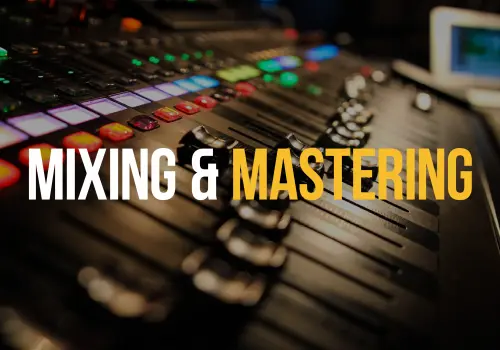
Producing your own music involves a barrage of different techniques and methods, and of these, mixing and mastering are essential to understanding the creation of your masterpiece.
What is mixing?
Mixing is the beginning of the post-production process. Once you’ve written , recorded, and produced your music, it’s time to mix. A mixing engineer is responsible for balancing the different tracks in the session so that they sound nice and cohesive when played together. They reduce the clash between instruments, voices, and different elements of the song.
A mix will also have several different tracks, between the different instrumental layers, harmonies, etc., a session can easily contain more than 30 tracks. In general, most mixing engineers begin their process by organizing and labeling each component, that is, placing all drum tracks in the same color and area of their workspace, synths, etc.
During mixing, many adjustments are made to each section to fine tune and create the desired sound. Mixing is about creating a balance between all aspects of the song, be it through volume, frequency, placement, or dynamics. This process is about enhancing the artist’s vision and making sure the original intention of the song shines through. Sometimes there are multiple mixes before both the artist and the producer are ready for the song to go to mastering.
What is mastering?
When the mix is complete, you are ready to move on to mastering. Mastering is the last stage of the production process, the last step your music takes before heading to distribution.
Mastering engineers also seek to achieve an overall balance, but unlike mixing, they do so on a broader spectrum throughout the song and throughout the album.
The goal of mastering is to polish the mix to the best possible sound and make your song or songs sound like other professional songs heard on streaming platforms, on the radio, in movies, etc. Its goal is to make the track louder, sound better, and more compatible with different types of speakers, usually by adjusting things like EQ, compression, limiting, and stereo enhancement.
A mastering engineer is the last person in the creative process who is in charge of spotting mistakes, changing the sound, and putting the finishing touches. If there’s a sound that shouldn’t be there (be it outside traffic, conversation, etc.), the mastering engineer has to be very vigilant and focused to spot those small but vital errors. It is helpful to have someone else master your project, as it is easier for you to catch mistakes or hear unwanted sounds because you haven’t been mixing the song for hours.
Mastering and mixing online
For those who are new to the world of audio, mastering and mixing may seem overwhelming or less accessible than recording or production, but rest assured that with today’s advances in technology you can mix and master online by watching Mastering tutorial . Not only is it much more accessible, but it is also more affordable than you might think.